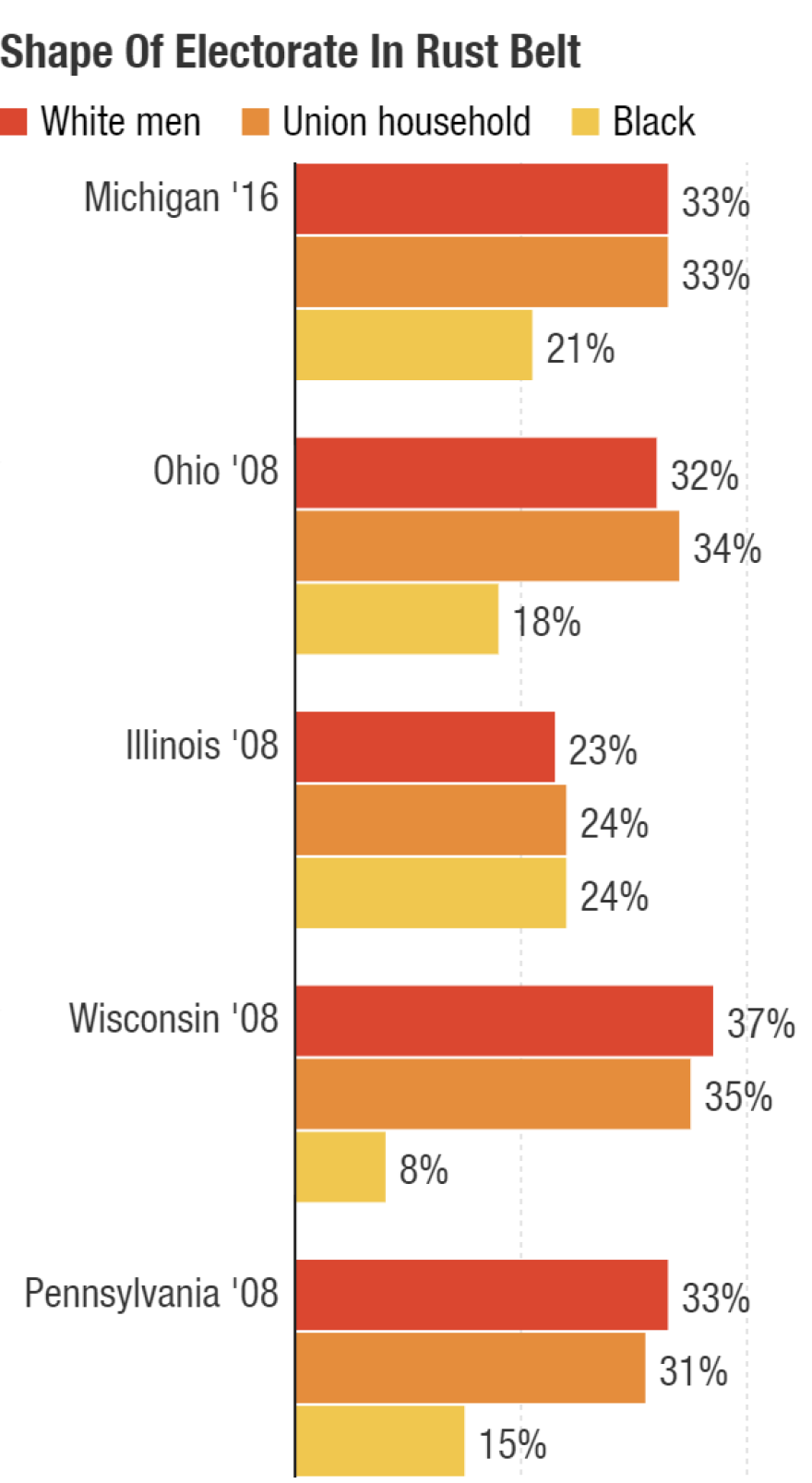When Bernie Sanders won the primary in Michigan last week, it shook up the narrative of the Democratic race.
Sanders did so with the help of white men. If he's able to pull off a victory in Ohio, the same demographic will likely be key.
Take Jim, who describes himself, only half jokingly, as an angry white man.
"We're pissed off," Jim said. (Jim's asked that his last name be withheld because his union, AFSCME, has endorsed Hillary Clinton, and he supports Sanders. He can't be quoted publicly going against his union.) "We haven't gotten raises. Our pensions have been cut. Our healthcare's increased."
And, Jim added, Sanders speaks to that. "Bernie, he speaks from the trenches," Jim said. "We feel that he's fighting for us."
In Michigan, Sanders won with the support of 62 percent of white men, who were one-in-three voters, according to exit polls. In 2008, in the Democratic primary in Ohio, white men turned out in strikingly similar proportions to this year's Michigan contest.
At the same time, black voters could make up a smaller proportion of the electorate and likely won't be enough to put Clinton over the top. In Michigan, Clinton won more than two-thirds of black voters and they were 21 percent of the electorate. In 2008, Barack Obama won nearly 90 percent of black voters in Ohio; they were just 18 percent of the electorate; and Clinton won the state, ironically, with the support of white voters, including white men.
Ryan, a member of a building trades union in Cleveland, who also asked NPR not to use his last name because his union has endorsed Clinton, feels the same way as Jim.
"She's [Clinton] seen as the centrist candidate," Ryan said. "And she's a big-money candidate. And big money and centrism hasn't been working for middle-class America for the past 30 years. Since Reagan."
When Ryan first saw Sanders speak a few months ago, something clicked. He said it was as if a politician was finally saying what Ryan had been thinking about the state of the country. Ryan was so swayed he even sent a small donation to Sanders campaign and later bought a T-shirt.
'Like NASCAR, everyone wear their patch'

At a union hall in Cleveland, both Jim and Ryan talked about rising health-care costs and trade deals that they believe have hurt much more than they helped.
Sanders overwhelmingly won voters in Michigan who thought trade deals cost American jobs — 58 percent of voters said so there, and Sanders won them 2-to-1. (One-in-three Michigan voters said they lived in a household with a union member. Clinton and Sanders split them. Likely accounting for that were black union members who went for Clinton. Those numbers are not split out in exit polls.)
Jim said he's only gotten one raise, really more like a cost-of-living adjustment, in eight years.
"You look at the stock market," he said, "it's gone up I don't know how many, a couple of hundred percent. You know, my wages have gone up 2-and-a-half percent. And who's speaking to that? Bernie is. And, yeah, I think maybe he's kind of like Don Quixote. But I mean that's part of the attraction. It really is. At least for me."
And Jim insists, this isn't about gender. He loves his congresswoman, who incidentally endorsed Sanders on Friday.
There are elements of Clinton's stump speech designed to speak to working-class men including the parts where she talks about punishing companies that ship jobs overseas. But it's clear from these interviews that Sanders' attacks on Clinton's trade record, her superPAC, her big money speeches to Wall Street banks — they are breaking through.
The money issue nags at Dave Passalacqua. He likes that Sanders gets his campaign cash from regular people.
"There's that old saying is politicians should be like NASCAR, everyone wear their patch," Passalacqua said. "You know, let's see what the patches are and [Sanders] doesn't need to wear a patch, because it's his own thing."
'Pie in the sky'
Passalacqua is executive vice president of the Communications Workers of America Local 4340 in Cleveland. His union has endorsed Sanders, but he's still undecided.
Passalacqua agreed to meet at a Cleveland diner along with Jim Goggin, a fixture in the city's labor community. He's an organizer for the Delaware Valley Health Care Coalition.
"It's pie in the sky," said Goggin, with an unmistakable Irish lilt. "I mean, everything Bernie says, I think would be fantastic. But the fact of the matter is, that I am also a realist, and I know that you can't do that."
For Goggin, it is all about beating the Republicans in November.
"And I wish to God that I thought he could win," Goggin said. "But I don't unfortunately think he can win. Consequently, I'm with Hillary, because at least she's not going to throw us under the bus, the working people."
Passalacqua chimes in: "And one good thing that Bernie's been doing, though, even with Hillary, is Bernie has moved Hillary's positions on things."
From the outside, it seems Passalacqua is having a classic voter's struggle between his head and his heart. He isn't convinced Sanders will be able to do what he's promising. Who will he vote for?
"Whoever I think is going best for me and my family is the bottom line. Whoever is going to make — not to steal Donald's line, but — America great again," said Pasalaqua quoting Donald Trump's catch phrase. "Because in order to make America great again we've got to make the middle class great again. So whoever's going to do that, I think's going to be the best person. And that's who I'll end up having to vote for."
No matter how Tuesday's vote turns out, and no matter who wins the nomination, all four men said they would support the Democratic nominee in November.
Copyright 2021 NPR. To see more, visit https://www.npr.org.



